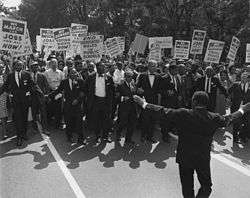Joseph L. Rauh Jr.
Joseph Louis Rauh Jr. (January 3, 1911 – September 3, 1992) was one of the United States' foremost civil rights and civil liberties lawyers. He was posthumously awarded the Presidential Medal of Freedom, the nation's highest civilian honor, by President Bill Clinton on November 30, 1993.
Joseph L. Rauh Jr. | |
|---|---|
| Born | January 3, 1911 Cincinnati, Ohio, U.S. |
| Died | September 3, 1992 (aged 81) |
| Alma mater | Harvard University Harvard Law School |
| Spouse(s) | Olie Westheimer (1935–his death) |
| Children | B. Michael Rauh, Carl S. Rauh |
Background
Rauh was born in Cincinnati, Ohio, the son of a German Jewish immigrant shirt manufacturer [1]. He did not follow in his father's footsteps, however, shirking textiles for Harvard University. There, he played center for the Ivy League school's basketball team. He graduated magna cum laude with a degree in economics in 1932, continuing his education at Harvard Law School, where he finished first of his class.[2]
Career
After clerking at the Supreme Court with Justice Benjamin N. Cardozo,[3] Rauh eventually was commissioned into the Army at the rank of lieutenant in 1942, working as a lend-lease expert in the midst of World War II. He served in civil affairs in the Pacific. He ultimately reached the rank of lieutenant colonel. He returned to Washington after the war and worked in private practice, focusing his efforts on fighting for civil liberties. He was general counsel for labor leader Walter Reuther and the United Auto Workers, handling much of the UAW's civil liberties policy.[4]
Civil rights

Rauh is best known for his championing of various civil rights causes.
In 1947, he helped found Americans for Democratic Action, alongside Eleanor Roosevelt, Walter Reuther, and Hubert Humphrey, among others.
Starting as a Democratic National Convention delegate in July 1948, he was a leader that year in writing up the civil rights plank for Humphrey. In the letter of support promoting his award of the Presidential Medal of Freedom, its authors described the plank as "the foundation for all of the human rights and equal protection laws that have since been enacted."[5]
On September 12, 1948 (a Sunday) at 8:30 PM, Elizabeth Bentley appeared again the first-ever television broadcast via WNBT of NBC's Meet the Press and was the first interviewed. Journalists included: Nelson Frank, Inez Robb, Cecil Brown, and Lawrence Spivak. Cecil Brown asked her three times whether she would accuse William Remington of being a communist outside of congressional protection, she finally did so. Joseph Rauh defended Remington before a Truman Loyalty Review Board.[6]
In 1959, Rauh successfully represented Quaker printer David H. Scull before the US Supreme Court in Scull v. Virginia ex rel. Committee on Law Reform & Racial Activities, which concerned aggressive and unclear questioning by the pro-segregation chairman of a Virginia legislative committee, which had led to a contempt citation the Supreme Court overturned.
Rauh also lobbied Congress for the passage of many civil rights bills, having a hand in the passing of the Civil Rights Act of 1964, the Voting Rights Act of 1965, and the Civil Rights Act of 1968. In addition, he fought against McCarthyism and was a long-time executive board member of the National Association for the Advancement of Colored People.[7]
Personal life
Rauh died in 1992 and was survived by his wife of 57 years, the former Olie Westheimer, and two sons, B. Michael Rauh and Carl S. Rauh and three grandchildren.[2]
His son, Carl S. Rauh, a Columbia University and University of Pennsylvania Law School graduate and lawyer in private practice, served as the United States Attorney for the District of Columbia from 1979 to 1980 and was nominated by President Ronald Reagan as a member of the District of Columbia Judicial Nomination Commission in 1986.[8]
Awards
- In 1993 he was posthumously awarded the Presidential Medal of Freedom by Bill Clinton.
- In 1983 he received the Franklin D. Roosevelt Four Freedoms Awards for the freedom of speech.[9]
See also
References
- Johnson, Niel (June 21, 1989). "Oral History Interview with Joseph L. Rauh Jr". Harry S. Truman Library. Retrieved June 19, 2020.
- Saxon, Wolfgang (September 5, 1992). "Joseph Rauh Jr., Groundbreaking Civil Liberties Lawyer, Dies at 81". The New York Times.
- Rauh, Joseph; Hellman, George S. (June 1940). "Benjamin N. Cardozo: American Judge". Harvard Law Review. 53 (8): 1404. doi:10.2307/1333824. ISSN 0017-811X.
- "Joseph L. Rauh Jr. Oral History Interview | Harry S. Truman". www.trumanlibrary.gov. Retrieved 2020-05-13.
- "Board Doubts If Remington Was Loyal". Washington Post. 29 September 1948. p. 3.
- "Appointment of Carl S. Rauh as a Member of the District of Columbia Judicial Nomination Commission | The American Presidency Project". www.presidency.ucsb.edu. Retrieved 2020-08-08.
- "Archived copy". Archived from the original on 2015-03-25. Retrieved 2015-04-04.CS1 maint: archived copy as title (link)
Further reading
- Parrish, Michael E. (2010). Citizen Rauh: An American Liberal's Life in Law and Politics. Ann Arbor: University of Michigan Press.